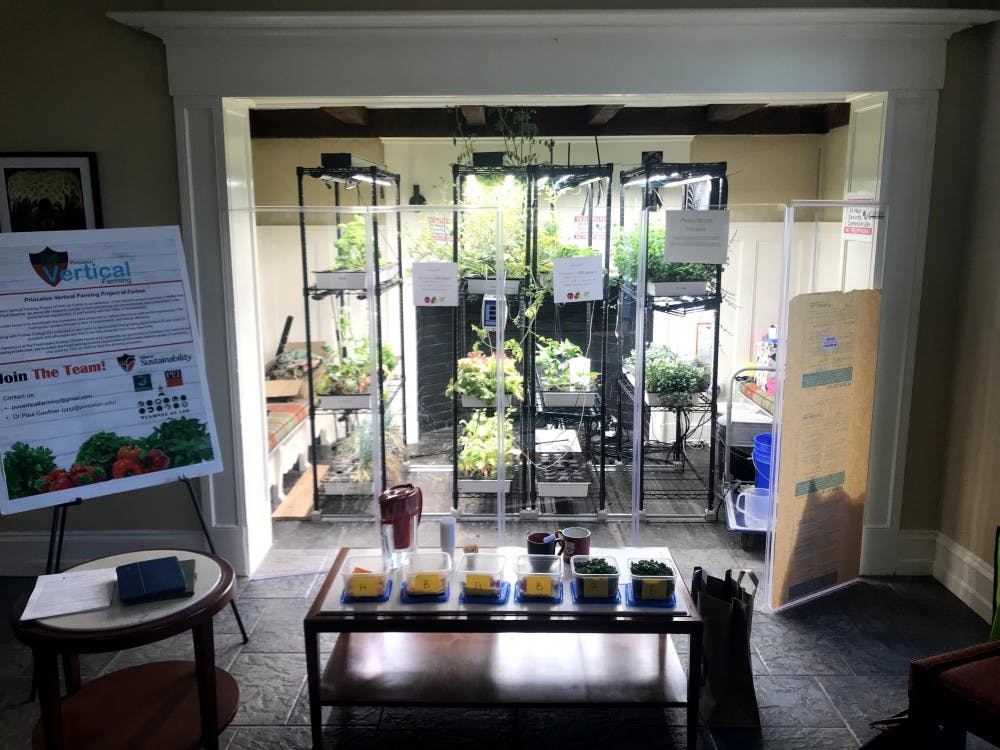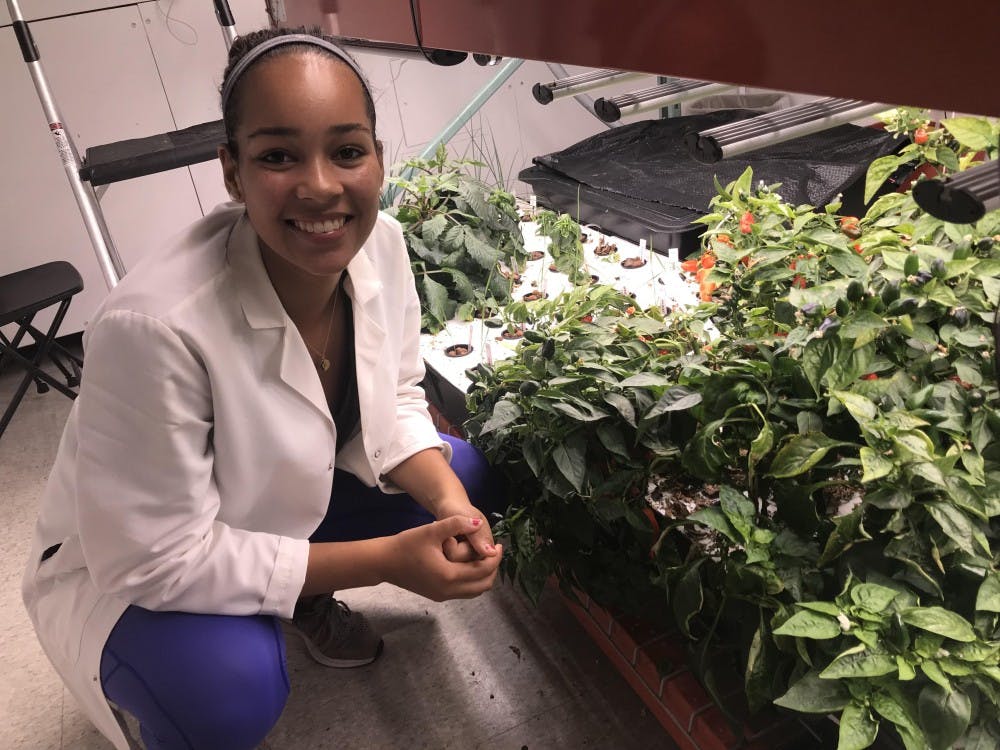After two years of operation, the Princeton Vertical Farming Project (PVFP), which introduced students to sustainable farming practices and provided fertile ground for research, has come to an end.
The PVFP was launched in April of 2017 by Paul Gauthier, who served as an associate research scholar in plant physiology and environmental plant metabolism in the Department of Geosciences beginning in 2012, in a windowless room in Moffett Laboratory. With support from the Office of Sustainability, Gauthier and student collaborators built and maintained the hydroponic vertical farm, where peppers, strawberries, herbs, and other plants were grown only with water and nutrient solutions—no soil.
At the end of June, Gauthier left for Delaware Valley University in Doylestown, PA, where he will start an appointment as Professor of Plant Science. Additionally, Gauthier now works for Bowery Farming, a vertical farm company in New York City, as Senior Agricultural Scientist in the Research and Development Department. Although an offshoot in Forbes College will remain, the main farm has been shuttered, with equipment in Moffett Laboratory dismantled and placed in storage.
As the global population continues to rise, vertical farming has grown in popularity, as the practice requires less water, space, and energy than traditional farms. Vertical farms can yield several harvests of fresh produce a year, which could help to feed growing urban centers.
According to Gauthier, although many start-ups have tried vertical farming, few have succeeded. Many have been forced to close after a few years due to lack of revenue and funding. In addition, he said, little research has been conducted on best practices, such as how water, nutrients, and the environment influence plant growth.
One of the primary motivations of the PVFP was to identify the problems and challenges associated with the technique and learn how to solve them — much like in traditional agriculture.
“People tend to forget that there is a ‘farming’ in ‘vertical farming,’” Gauthier said. “You are a farmer first.”
To that end, the farm experimented with different techniques, seeking to determine how to feed a family of four by quantifying nutrient usage, testing new technologies, and planting a variety of crops.
Another goal of the project was to create an on-campus “food hub,” where students could gain experience with farming and learn about food sustainability. Gauthier said that he wanted students to understand the commitment and responsibility that vertical farming entails.
“We want to train the next generation of vertical farmers,” he said.
Several students have taken on the burdens of both research and responsibility by conducting senior thesis projects with the PVFP. In the PVFP’s first year, projects ranged from a Department of Ecology and Evolutionary Biology (EEB) thesis comparing environmental impacts of vertical and conventional farming to a Wilson School thesis on the economic costs of running a vertical farm.
In her EEB thesis, Kor Akiti ’19 compared the palatability and nutritional quality of crops grown in the Vertical Farm to organic, soil-grown crops from a local grocer.

Akiti performed several “taste tests” in the Forbes dining hall and Frist Campus Center, asking passersby to taste and rank the produce – kale, peppers, and strawberries – on appearance, taste, and texture. She then asked tasters: which would you buy at the supermarket?
Using a technique called mass spectrometry, she was able to conclude that nutrient profiles of vertical farm and soil-grown crops were similar, but the hydroponic crops lacked visual appeal.
“One of the main takeaways was that the appearance of the hydroponic crops was significantly less satisfying than the appearance of the soil-grown crops across the board,” she said. “If vertical farming is going to be competitive, whether it’s in the context of Princeton, on campus, or in the larger urban market, farmers are going to have to find a way to make their produce more appealing, because appearance is such a critical point of purchase.”
Overall, her findings suggested the complexity of consumer choice and preference, hinting at challenges to come in not only growing crops in vertical farms but also in marketing them.

A taste test set up at the Forbes College vertical farm for Akiti's thesis project.
Photo Courtesy of Kor Akiti
The impact of the PVFP has been considerable, not only in advancing research but also in contributing to outreach and education.
In September 2018, Gauthier partnered with Hopewell Elementary School in Hopewell, N.J., to develop a farm-to-cafeteria program. The initiative provides students with the opportunity to grow their own fresh produce, almost all of which is then used in school lunches.
Gauthier also co-founded his own indoor farming company, Ker Farms (pronounced “care”), in Hamilton, N.J., which grows and sells a variety of fruits and vegetables. According to Gauthier, the company is also training local educators in the hope of bringing vertical farming to more schools in the area.
“There is no question about it,” Gauthier said. “Vertical farming will be part of our lives.” Thus, Gauthier continued, it is essential that young people know how to grow, interact, and experiment with plants from a young age, so they can be prepared for the future.
Similar concerns motivated the establishment of an offshoot of the PVFP in the lobby of Forbes College in the fall of 2018. This mini-vertical farm was intended as a different kind of experiment – to see how farming could integrate into the daily life of a busy Princeton student, as Gauthier put it.
The conclusion, he said, was that taking care of plants was harder than it seemed.
Kaylin Xu ’22 played a leading role in maintenance of the Forbes College farm, changing the water, checking nutrient levels, and making adjustments to optimize conditions for growth. It was a labor-intensive job, Xu admitted, and although other students cycled in and out to help, she was one of the only people to consistently care for the plants. Xu hopes that the maintenance of the Forbes “farm” will become more communal.
“I want to get more of the Forbes community involved in having a hand in creating this green space, because I feel like that is really unique,” Xu said.
“Unfortunately, students are busy,” Xu continued, making it difficult to find dedicated members to join the team.
Gauthier also emphasized how important it was for future farmers to be dependable. “Plants are like babies,” Gauthier said. Just as a parent cannot ignore the cries of a hungry child, so a plant cannot go without water.
This past year, products from the Forbes offshoot and the main farm were featured in several “Meet What You Eat” dinners in the dining halls, where students could sample fresh produce incorporated into pastas, flatbreads, and more. In the fall, the Forbes farm will continue to grow crops for use in the Forbes kitchen and the Pink House food-share.
“I hope [the vertical farm in] Forbes will continue the spirit of sustainability,” Xu said, as the torch is passed from the original farm.
In his new position at Delaware Valley, Gauthier hopes to continue the work he started at Princeton, reproducing the vertical farm model on a larger scale and developing local projects and collaborations.
Although the Hopewell ES program and the Forbes offshoot will continue, the PVFP in its official capacity has ended – much like the start-ups and companies Gauthier was interested in when he began.
“I would have loved to continue,” Gauthier said of the project. “It’s important to start thinking and finding solutions for the future.” The University was a unique place for such an undertaking, he said, as it allowed for cross-pollination from a variety of fields of study.
“All different departments – computer science, MAE [Mechanical and Aerospace Engineering], EEB, business, architecture – students from all these departments were working on the vertical farm,” Gauthier said. “We can tackle the problem from very different disciplines.”
Gauthier did not rule out the possibility of reviving the PVFP.
“If there is demand, maybe the project will come back,” he said.
This story has been updated on Aug. 15, 2019 to reflect Gauthier’s new position with Bowery Farming.








